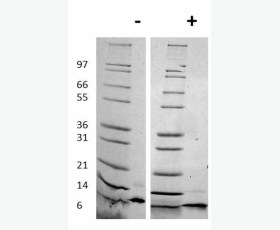Recombinant Human Pterin-4-α-Carbinolamine Dehydratase/PHS/PCBD1
| Product name: | Recombinant Human Pterin-4-α-Carbinolamine Dehydratase/PHS/PCBD1 |
| Source: | E.coli |
| Purity: | Greater than 95% as determined by reducing SDS-PAGE. |
| Buffer Formulation: | Supplied as a 0.2 μm filtered solution of 20mM TrisHCl, 150mM NaCl, 1mM DTT, pH 8.0. |
| Applications: | Applications:SDS-PAGE; WB; ELISA; IP. |
| Storage: | Avoid repeated freeze/thaw cycles. Store at 2-8 oC for one month. Aliquot and store at -80 oC for 12 months. |
| UOM: | 100ug/50ug/200ug/1mg/1g |
| Source | E.coli |
| Description | Recombinant Human PCBD1 is produced by our E.coli expression system and the target gene encoding Ala2-Thr104 is expressed with a 6His tag at the N-terminus. |
| Names | Pterin-4-Alpha-Carbinolamine Dehydratase, PHS, 4-Alpha-Hydroxy-Tetrahydropterin Dehydratase, Dimerization Cofactor of Hepatocyte Nuclear Factor 1-Alpha, DCoH, Dimerization Cofactor of HNF1, Phenylalanine Hydroxylase-Stimulating Protein, Pterin Carbinolamine Dehydratase, PCD, PCBD1, DCOH, PCBD |
| Accession # | P61457 |
| Formulation | Supplied as a 0.2 μm filtered solution of 20mM TrisHCl, 150mM NaCl, 1mM DTT, pH 8.0. |
| Shipping |
The product is shipped on dry ice/ice packs. |
| Storage |
Store at < -20°C, stable for 6 months after receipt. Please minimize freeze-thaw cycles. |
| Purity |
Greater than 95% as determined by reducing SDS-PAGE. |
| Endotoxin | Less than 0.1 ng/µg (1 IEU/µg) as determined by LAL test. |
| Amino Acid Sequence |
MGSSHHHHHHSSGLVPRGSHMAGKAHRLSAEERDQLLPNLRAVGWNELEGRDAIFKQFHFKDFNR AFGFMTRVALQAEKLDHHPEWFNVYNKVHITLSTHECAGLSERDINLASFIEQVAVSMT
|
| Background | Pterin-4-α-Carbinolamine Dehydratase (PCBD1) is the founding member of the Pterin-4-α-Carbinolamine Dehydratase Family. PCBD1 is involved in Tetrahydrobiopterin biosynthesis. It seems to prevent the formation of 7-Pterins and accelerate the formation of Quinonoid-BH2. Furthermore, PCBD1 regulates the homodimerization of the transcription factor Hepatocyte Nuclear Factor 1 (HNF1) and enhances its transcriptional activity. Defects in PCBD1 are the cause of BH4-Deficient Hyperphenylalaninemia Type D (HPABH4D). HPABH4D is characterized by the excretion of 7-substituted Pterins in the urine of affected patients. |














